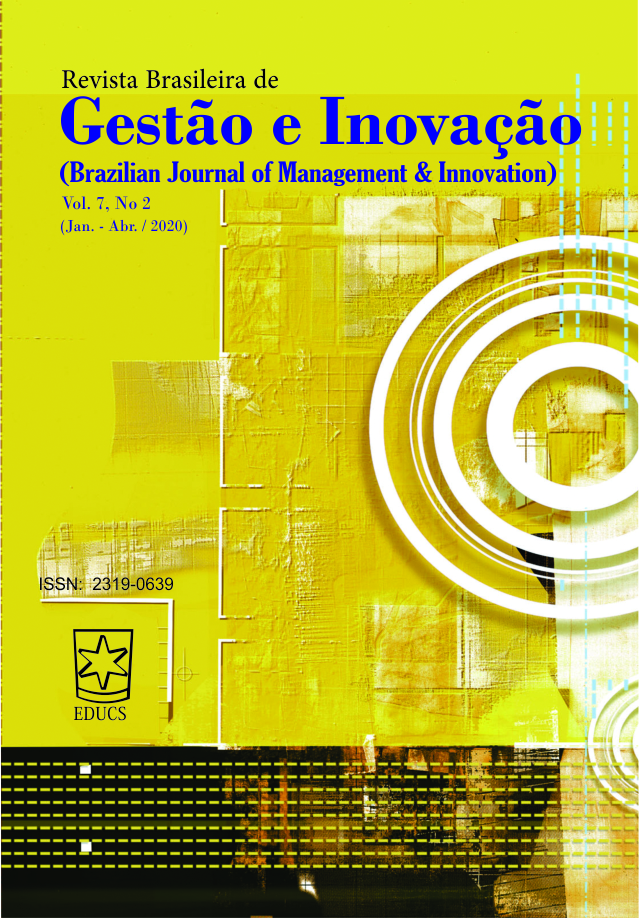ENSAIO TEÓRICO SOBRE INOVAÇÃO ORGANIZACIONAL NO AGRONEGÓCIO | THEORETICAL ESSAY ABOUT ORGANIZATIONAL INNOVATION IN THE AGRIBUSINESS
Keywords:
Atividades Agrícolas. Gestão da Inovação. Processo de Inovação.Abstract
A inovação configura-se como um fenômeno complexo e dinâmico, cuja interface organizacional que caracteriza-se pela sua dificuldade de entendimento e, sobretudo de mensuração, reflete na minimização de estudos que intentam compreendê-la. Com vistas à essa perspectiva, este ensaio teórico aborda a problemática sob o contexto do agronegócio, considerando seus fenômenos e stakeholders. Além da relevância socioeconômica desse segmento, tal circunscrição é pautada pela maximização de apelos concernentes a segurança alimentar, avanços tecnológicos na produção de alimentos, criação de novos nichos de mercado e vantagem competitiva sustentável. Assim, embasadas na literatura clássica, no estado da arte e em descobertas empíricas são apresentadas distintas proposições genéricas a partir de constructos teóricos pré-estabelecidos. Dentre estas, tem-se a influência direta e positiva entre aprendizagem organizacional e inovação organizacional e entre orientação para o mercado e inovação organizacional. Também, verificou-se a possibilidade da capacidade absortiva agir como variável mediadora da relação entre inteligência competitiva e inovação organizacional. Sob uma abordagem específica, sugere-se também que as cadeias produtivas agroindustriais consideradas como curtas, tanto requerem quanto promovem a inovação organizacional. Desse modo, são oferecidos insigths acerca dessa tipologia de inovação, precariamente explorada no âmbito agrícola, de modo que se apresentam sugestões para investigações futuras pautadas nestas proposições.
DOI: 10.18226/23190639.v7n2.07
Alice Munz Fernandes*, Universidade Federal do Rio Grande do Sul (UFRGS). Brasil.
E-mail: alicemunz@gmail.com
Daniela Callegaro de Menezes, Universidade Federal do Rio Grande do Sul (UFRGS). Brasil.
E-mail: daniela.callegaro@ufrgs.br
Ângela Rozane Leal de Souza, Universidade Federal do Rio Grande do Sul (UFRGS). Brasil.
E-mail: angela.rsl@gmail.com
Luiz Clóvis Belarmino, Empresa Brasileira de Pesquisa Agropecuária (EMBRAPA). Brasil.
E-mail: luiz.belarmino@embrapa.br
Submetido: Janeiro 2019
Aceito: Maio 2019
*Contato para Correspondência
Downloads
Published
How to Cite
Issue
Section
License
The author must guarantee that:
- there is full consensus among all the coauthors in approving the final version of the document and its submission for publication.
- the work is original, and when the work and/or words from other people were used, they were properly acknowledged.
Plagiarism in all of its forms constitutes an unethical publication behavior and is unacceptable. Revista Brasileira de Gestão e Inovação has the right to use software or any other method of plagiarism detection.
All manuscripts submitted to RBGI - Revista Brasileira de Gestão e Inovação go through plagiarism and self-plagiarism identification. Plagiarism identified during the evaluation process will result in the filing of the submission. In case plagiarism is identified in a manuscript published in the journal, the Editor-in-Chief will conduct a preliminary investigation and, if necessary, will make a retraction.
This journal, following the recommendations of the Open Source movement, provides full open access to its content. By doing this, the authors keep all of their rights allowing Revista Brasileira de Gestão e Inovação to publish and make its articles available to the whole community.
RBGI - Revista Brasileira de Gestão e Inovação content is licensed under a Creative Commons Attribution 4.0 International License.
Any user has the right to:
- Share - copy, download, print or redistribute the material in any medium or format, linking to RBGI site.
- Adapt - remix, transform and build upon the material for any purpose, even commercially.
According to the following terms:
- Attribution - You must give appropriate credit, provide a link to the license, and indicate if changes were made. You may do so in any reasonable manner, but not in any way that suggests the licensor endorses you or your use.
- No additional restrictions - You may not apply legal terms or technological measures that legally restrict others from doing anything that the license permits.
#RBGI







